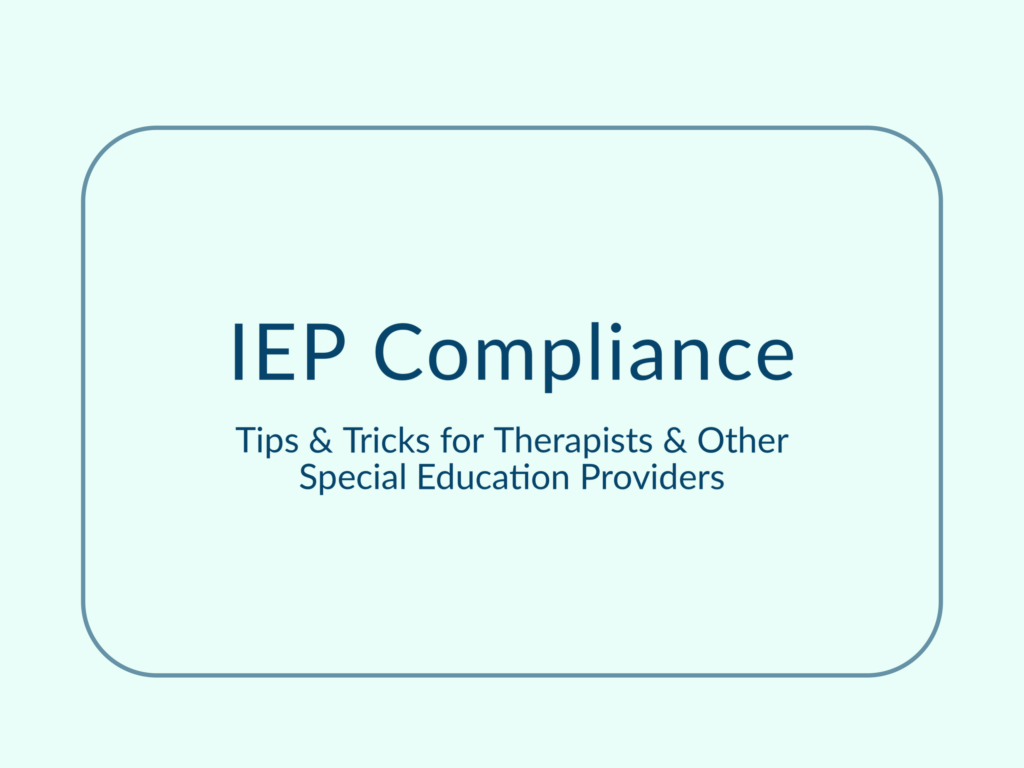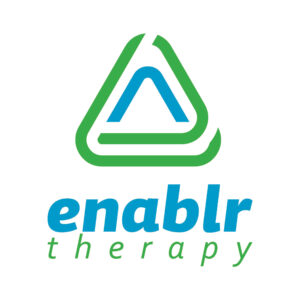IEP (Individualized Education Program) compliance is important as it helps to ensure success of both the students and the special education staff. By ensuring that student services are being provided and student goals are being addressed, the team can promote student learning and achievement that will have a positive impact throughout their life.
By tracking IEP data related, therapists and the special education team can see where the student and the team need support. Administrators are much more likely to listen to staff if concerns are backed by data, not just opinion. In addition,it is important to notice and celebrate accomplishments and milestones met by the student as well as the team.
Below are a few simple ideas that can help special education professionals keep a pulse on their caseload and ensure that their students are receiving the IEP services that they need.
Keep a Calendar of Due Dates:
This is one of the simplest things to do. At the start of the year, all special education providers should review the IEPs for students on their caseload. By creating events on a calendar for IEP and re-evaluation due dates as well as setting reminders a few weeks in advance, therapists and other special education staff will have advance notice so that they can thoughtfully write up present levels and proposed goals. Team members can be added to the invites so that all notices are received by all. Please be mindful of student confidentiality when using a calendar, use only their first name and last initial or first initial and last name to protect their privacy.
Monitor Progress Toward Goals:
Many therapists use SOAP notes to track session progress which can be useful but may also be time consuming. Try using goal tracking methods such as self-graphing data sheets that allow for fast in-session documentation and provide an “at-a-glance” overview of the student’s progress. Click here to view and download several self-graphing data sheets.
Tracking progress is essential to ensure that the student’s program is meeting their needs. If a student is not making progress, special education providers are highly encouraged to reconvene an IEP meeting, making adjustments to the goals and services as needed that will best support the student.
Track Services Provided:
Therapists and other special education providers should track when, where and how much service time is provided. This helps to ensure that the student is receiving the services that are listed in the IEP. Be mindful of how the frequency is listed in an IEP. For instance, services that are listed as 1 time per week are not the same as 4 times per month. A shorter month like December is a good example of this. A student who is 1 time per week may only be seen 2-3 times in December versus a student that has services 4 times per month would still need to be seen 4 times before winter break.
Service providers may find it beneficial to calculate the total time owed for the year and then deduct time as it is provided. As an example, a student with therapy one time per week for 30 minutes would be owed 19 hours of therapy if there were 38 weeks of school in the year. Each time a session is provided, 30 minutes could be deducted from that total. Notes about when a student is seen, where and for how long can be made on session data tracking sheets.
This data may also be helpful in talking with administrators if caseload numbers and services are high. Hard data, instead of opinion, can be presented on the number of services that a therapist is able to provide (or not provide) within a school day, making an objective case for redistribution of caseload or other responsibilities if needed.
Collaborate with Parents, Teachers, and Other Staff:
Many times, therapists and other related service providers may not have direct interaction with parents or other professionals on a daily basis. In order to open lines of communication and lay the foundation for teamwork, it is important for service providers to take initiative and introduce themselves. It goes a long way to build trust. Trust plays an essential role in how the team works together to address the student’s needs through the IEP process.
Service providers can utilize templates to check in with parents and staff members throughout the school year. Click to view the start of the year and post first progress note check in for parents and staff.
Prepare for and Collaborate at IEP Meetings:
There are multiple things that can help special education provider with writing up the present levels and proposed goals such as:
- Reviewing the student’s data, talking with teachers, other classroom staff, parents and the student to get input
- Collecting recent work samples
- Considering grade level standards
Be sure to focus on both the student’s strength and needs. It is also important to be familiar with the procedural safeguards for each state. This can typically be found by visiting the state’s department of education website or by asking a case manager to share them. By being prepared, team members will be able to collaborate more effectively in developing an effective plan for the student. Keep an open mind when concerns and suggestions are raised from the teachers and parents who interact with the student the most.
Learning from the Past
Complying with IEP procedural safeguards, providing required services, and monitoring progress is not just a good thing to do, they are a legal obligation. Failure in any one of these areas can result in legal action that is time consuming, stressful, and costly to the family, school staff, and school district. Below are examples of lawsuits that may have been avoided if proper tracking and reporting of services and progress were done or lines of communication opened.
Rogich vs. Clark County School District (Nevada, 2021)
In this case, the parents provided outside evaluation results, information about literacy methodologies for dyslexia, and even offered to pay for teachers to be trained in those methods in an effort to get appropriate services for their child. During the IEP proceedings, the district would not discuss the specific methods recommended in the evaluation reports by the outside experts and did not specify what methods and programs they would use to address the student’s needs in the IEP that would be commensurate.
The judge ruled “It is evident that these procedural and substantive violations resulted in the denial of a FAPE. Not only did they “seriously infringe the parents’ opportunity to participate in the IEP formulation process,” but they also resulted in the loss of educational opportunity for O.R.”
Endrew F vs. Douglas County School District FE (US Supreme Court, 2017)
Endrew was a 5th grade student with autism and ADHD. He had an IEP that was in place from kindergarten through 4th grade but during that time his progress stalled. The district proposed an IEP in 5th grade but the parents rejected it as they felt it was more of the same and would not improve his outcomes. His parents then withdrew him from school and placed him in a specialized school where he progressed.
They sued after their attempts to be reimbursed from the district failed. In an anonymous ruling by the US Supreme Court, they found “To meet its substantive obligation under the IDEA, a school must offer an IEP reasonably calculated to enable a child to make progress appropriate in light of the child’s circumstances.” “When all is said and done, a student offered an educational program providing ‘merely more than de minimis’ progress from year to year can hardly be said to have been offered an education at all. For children with disabilities, receiving instruction that aims so low would be tantamount to ‘sitting idly’…awaiting the time they were old enough to drop out. The IDEA demands more.”
Denver Public Schools (Colorado Department of Education, 2023)
A complaint was lodged against the school district alleging that they violated IDEA by not providing required speech and language therapy services to over 1000 students beginning August 2022. The district provided a response to these allegations. However, in March 2023, the State Complaint officer issued a decision, “District failed to implement the IEPs of over 1,000 Students from January 17, 2022 to present, by failing to provide them with the SLP minutes required by their IEPs, in violation of 34 C.F.R. § 300.323. This violation resulted in denials of FAPE.” The district is now working on a corrective action plan as they offer compensatory services to all families.
Ensuring IEP compliance is not just recommended, it is required. It will help special educators to do their job better and students to progress. It is the right thing to do.
Learn more about types of therapies here.
Reference
Special Education Caselaw (2021). Wrightslaw. Retrieved from https://www.wrightslaw.com/caselaw.htm.



